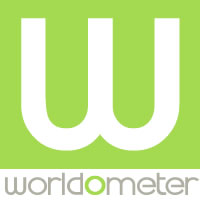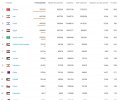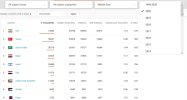ArabianEmpires&Caliphates
SENIOR MEMBER

- Joined
- Aug 2, 2016
- Messages
- 2,377
- Reaction score
- 4
- Country
- Location
KSA:
722.002 total cases
1,098,430 tests/1m pop
8.965 deaths
251 deaths/1m pop
Iran:
6,730,608 total cases
530,872 tests/1m pop
133,294 deaths
1,555 deaths/1m pop

 www.worldometers.info
www.worldometers.info
That is a huge difference in terms of total cases, test performance, number of fatalities and death rate.
Have in mind that KSA was visited by 16.4 million tourists in 2019 compared to Iran's mere 4.4 million (2017).
 en.wikipedia.org
en.wikipedia.org
Likewise have in mind that KSA/GCC is one of the main aviation hubs in the world and home to one of the largest migrant populations in the world.
Further reading:

 insights.omnia-health.com
insights.omnia-health.com
NUPCO CEO on How Saudi Arabia Got its COVID-19 Response Right

 pharmaboardroom.com
pharmaboardroom.com
Economic impact:
RIYADH - The kingdom of Saudi Arabia in 2021 has recorded its highest ever non-oil revenues.
While the business climate index for the non-oil economy has grew by more than 13% in October.
Finance Minister Mohammed Al-Jadaan confirmed that the Kingdom's non-oil output will grow by 4.8% in 2022 and at a rate of 5% in 2023 and 2024.
The Crown Prince Muhammad Bin Salman said Saudi Arabia has achieved high rates of real GDP growth for the non-oil sector, which amounted to about 5.4% until the end of the third quarter of 2021.
The Kingdom achieved a record level of SR372 billion on its non-oil revenues in the budget of 2021, which is equivalent to 40% of the total state revenues, amounting SR930 billion.
This statement came after Saudi Arabia’s Council of Ministers approved the general budget for the fiscal year of 2022 on Sunday, with an estimated total revenues of SR1045 billion and spending of SR955 billion.

 saudigazette.com.sa
saudigazette.com.sa
Discuss.
722.002 total cases
1,098,430 tests/1m pop
8.965 deaths
251 deaths/1m pop
Iran:
6,730,608 total cases
530,872 tests/1m pop
133,294 deaths
1,555 deaths/1m pop

Coronavirus Update (Live): 131,507,374 Cases and 2,861,601 Deaths from COVID-19 Virus Pandemic - Worldometer
Live statistics and coronavirus news tracking the number of confirmed cases, recovered patients, tests, and death toll due to the COVID-19 coronavirus from Wuhan, China. Coronavirus counter with new cases, deaths, and number of tests per 1 Million population. Historical data and info. Daily...
That is a huge difference in terms of total cases, test performance, number of fatalities and death rate.
Have in mind that KSA was visited by 16.4 million tourists in 2019 compared to Iran's mere 4.4 million (2017).
World Tourism rankings - Wikipedia
Likewise have in mind that KSA/GCC is one of the main aviation hubs in the world and home to one of the largest migrant populations in the world.
Further reading:
Prompt action defines Saudi Arabia’s success story in emerging from COVID-19

Prompt action defines Saudi Arabia’s success story in emerging from COVID-19
COVID-19 mortality rates within Saudi Arabia is approx 0.9 per cent, which is lower than the global rate.
NUPCO CEO on How Saudi Arabia Got its COVID-19 Response Right

NUPCO CEO on How Saudi Arabia Got its COVID-19 Response Right
Saudi Arabia’s response to COVID-19 stands up well to international comparisons in both the MENA…
Economic impact:
Saudi Arabia's 2021 budget records highest non-oil revenues ever
December 13, 2021RIYADH - The kingdom of Saudi Arabia in 2021 has recorded its highest ever non-oil revenues.
While the business climate index for the non-oil economy has grew by more than 13% in October.
Finance Minister Mohammed Al-Jadaan confirmed that the Kingdom's non-oil output will grow by 4.8% in 2022 and at a rate of 5% in 2023 and 2024.
The Crown Prince Muhammad Bin Salman said Saudi Arabia has achieved high rates of real GDP growth for the non-oil sector, which amounted to about 5.4% until the end of the third quarter of 2021.
The Kingdom achieved a record level of SR372 billion on its non-oil revenues in the budget of 2021, which is equivalent to 40% of the total state revenues, amounting SR930 billion.
This statement came after Saudi Arabia’s Council of Ministers approved the general budget for the fiscal year of 2022 on Sunday, with an estimated total revenues of SR1045 billion and spending of SR955 billion.

Saudi Arabia's 2021 budget records highest non-oil revenues ever
The kingdom of Saudi Arabia in 2021 has recorded its highest ever non-oil revenues.
 saudigazette.com.sa
saudigazette.com.sa
Discuss.













